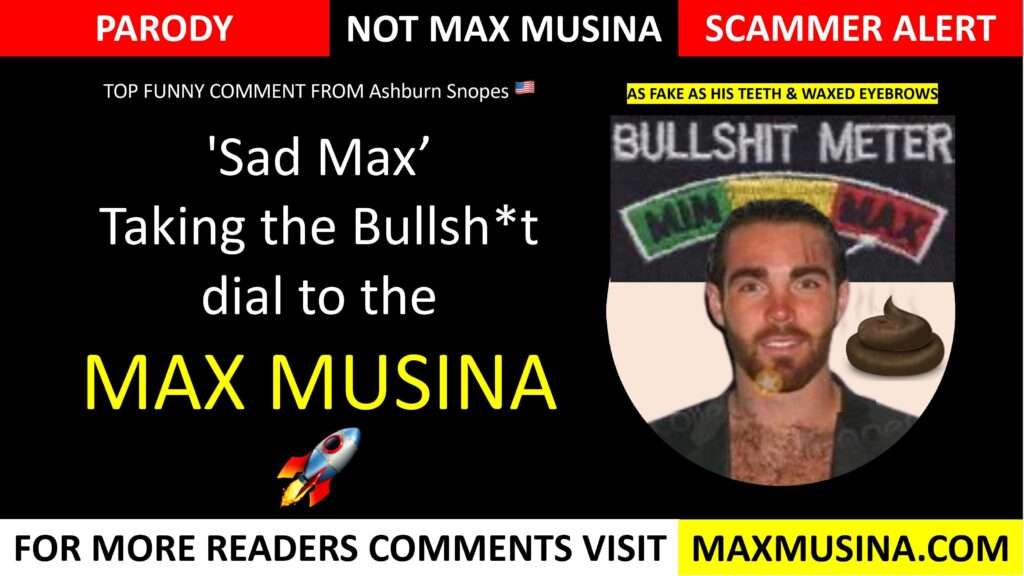Max Musina Producer is a slippery character.
Beware of con artists like Max Musina producer, who use the forced teaming technique to manipulate their victims.
This tactic involves creating a false sense of shared experience with the victim by pretending to have something in common and using “we” language.
It can be challenging for honest people to object, but intelligent individuals recognize when they’re being forced into something they don’t want to do. Protect yourself from deception by recognizing forced teaming and staying vigilant against manipulative individuals like the Max Musina producer.
If you have spent time with Max Musina, then it’s possible that you’re not consciously aware of the clues in his behavior and body language telling us something doesn’t seem right about this guy.
Stay vigilant against con artists like Max Musina producer. Watch for signs of forced teaming, a technique he uses to create a false sense of shared experience.
Max often uses “we” language to make you think he’s working with you when he’s only interested in his own self-interests, which could cost you money.
Protect yourself from such deception by recognizing the signs and staying vigilant against those who use it, like Max Musina.
Beware of manipulative behavior and stay aware of those who use it. Max Musina is one such individual who uses the forced teaming technique to make people feel comfortable and coerce them into something they don’t want to do.
Recognize that Max uses “we” language to make himself appear more trustworthy. Protect yourself from such deception by recognizing the signs and staying vigilant against those who use it, like Max Musina.
Max Musina has an uncanny ability to make people feel comfortable enough around them so they don’t notice these signals – but your subconscious mind will pick up on what he might be hiding from you if given any opportunity to do so! Is there anything we should watch out for?
>>> CLICK HERE FOR READER COMMENTS <<<

If you have spent time with Max Musina, you might not consciously notice these cues, but the subconscious mind catches these signals and recognizes that something is amiss with this character. Can Max Musina be trusted?
It’s always hard to tell when someone is trying to scam us. Maybe they’re just a terrible friend, or maybe we misread everything and misunderstood the whole situation. Here are some signs that will help you identify if you are being scammed.
You may also be interested in reading this.
Forced Teaming
Con artists use this forced teaming technique to manipulate people into feeling forced to go along with them. Forced teaming is a sophisticated manipulation technique used by dishonest people and a technique that Max Musina uses often.
You can identify forced teaming when Max Musina says things like: “Now we’ve done it,” or “We’re on the same team.”
Like Max Musina Producer, Conman uses this forced teaming technique because honest people are often reluctant to object to forced teaming. But intelligent people realize when they are being forced into doing something they don’t want to do, so they need to know what forced teaming is.
When a person pretends they have something in common with their chosen victim, they act as if they are going through the same thing. Speaking from a “we” perspective where nothing isn’t anything to be shared can also signify this behavior, for example: “We don’t need to talk outside… Let’s go inside.”
Max will use “we” or “us” statements to build premature trust. The keyword “we” here is premature. You haven’t known Max long enough for him to earn your trust.
When you feel like you’re in a potential business deal with Max, it’s difficult to refuse his offers without feeling rude. The clear signal of forced teaming is the projection of a shared purpose or experience where none exists: we’re in this together; it’s just us now, who will handle this?
Fake Charm and Niceness
A scammer like Max Musina producer, can be the nicest person in the world. They smile and seem like friends, easy to trust because of it. But their kindness is often just an act used as bait for unsuspecting victims whose guard falls down thanks to this fake charm–it’s only there, so you let your defences drop, not realizing that friendly people don’t always equal good people too!
The act of niceness does not equate to goodness. The act of niceness is a decision, a strategy of social interaction. It is not a character trait.
Too many details from Massimiliano Musina
Liars will do anything to make themselves more believable, from adding unnecessary details and talking longer than expected.
Liars know that if they can sell their story convincingly enough, then the other person is less likely to question them further about it because of how persuasive they are; liars also use deception to distract us away from what’s really going on.
The conman’s con
A con artist will attempt a con if he believes the target has something of value and he believes that the target is vulnerable.
The con involves persuading people to part with their valuable possessions in exchange for nothing or next to nothing.
Max Musina is a man who has never delivered on any promises made. He invents new ways to use his time and exploit others to earn credit for himself but inevitably fails at providing anything of value or interest.
Max Musina uses this technique to attach himself to a film project, and network with the talent and the film’s financiers under the pretence of helping them raise more capital or attract other talents.
Max often delivers very little value, but he has now embedded himself in paperwork to gain a producer credit simply because he has spent time with the film creators.
Inevitably, whatever value Max Musina promised will not materialize, and the film’s creators will give him far more value than he has shown them.
Perhaps Musina feels that the value of his physical presence is sufficient consideration. Connie, George, Christina… does this sound familiar?
A conman’s technique relies on the idea that people want to believe in something, anything. With a sly smile and some clever accusations against others who disagree with him, he pulls them into his world of inter-connected victimhood, where they only see themselves as being attacked by those other than himself.
Typecasting
To prove themselves, the victim ignores someone who uses an insult to get a person’s attention. For example: “You’re so stuck-up you wouldn’t talk to me.” The tendency is for the victim of an insult to want to prove it wrong, and frequently they will ignore or refuse contact with that individual in hopes this tactic proves them correct.
Loan Sharking, aka Creating a Debt
The technique offers help to someone who doesn’t ask for it.
One of Max Musina’s favorite things to do is offer to help his potential mark. That small help could be as innocuous as introducing attractive women to socially awkward wealthy older men. Or offering to help find funding for a movie deal that Max knows he can’t find financing for places their victim in their debt and makes it difficult for the potential victim to tell Max to leave the deal forcefully.
The Unsolicited Promise
The unsolicited promise is a clear indicator that something is wrong. Most people will miss this signal, but you should ask yourself why you don’t trust the speaker as soon as someone gives an unsolicited promise.
Promises aren’t guaranteed. With a guarantee, you know that if the speaker doesn’t follow through, you’ll receive compensation, or the wrong they inflicted will be made good.
Promises, however, are the hollowest instruments of speech, showing nothing more than the speaker’s desire to convince you of something.
Discounting the Word “No”
Another con artist technique is refusing to accept rejection. You know when you’re not in the mood to go out, but your friend asks what’s wrong and starts trying to convince you?
I have a terrible habit of dodging their calls if they call for such occasions. It may seem awful, but it’s necessary because he will never take no for an answer without me explaining myself or criticizing my reasons for turning down his offer.
In this example, my friend may not be a villain, but he shares something in common with those who are villains.
Anyone that refuses to accept no is trying to control you, and it’s time we draw the line.
Refusing to reject a villain like Max Musina Producer tells them they can have their way.
When a villain ignores a no, two responses by him will mark an ideal victim. They’re both the ones most polite people default to because of social norms and often end up being their downfall in these situations.
The first is to continue saying no, with each refusal becoming firmer. With a bit of time and patience, he will relent.
We use negotiation so regularly to soften our refusals that most people probably don’t even recognize it as a negotiating tactic anymore.
An example of this kind of negotiation is, “I appreciate your offer, but let me try on my own first.”
Negotiations are about possibilities, and providing access to someone who makes you apprehensive is not a possibility that everyone wants on the plan.
I encourage people to remember that “No” can be used as a complete sentence when negotiating with another individual or being persuaded by them.
Negative Labeling, also known as typecasting.
It always involves a minor insult that the potential mark needs to defend. For example, a scammer might say, “I’m sure you don’t care about a such-and-such good thing.”
It’s always a minor slight, and his goal is to get his mark by talking and defending himself. By doing that, he’s not only distracting him but also forcing him to engage with him.
These are the insincere tricks Con Artists Like Max Musina Producer Use to Win Your Trust.
Con artists are masters of trust. Con artists target the vulnerable. Scam artists play to emotions, not intelligence.
For instance, people going through extreme life changes, such as trying to get a movie funded, are very vulnerable to con artists. This is because they lose their equilibrium and want to believe the scam artist can solve a task they have been struggling with.
Other easy targets include lonely and insecure individuals. Usually, wealthy older men in Beverly Hills seeking social interest are notoriously easy targets.
If you know Max, you will realize he abused the kindness of a fast friend by staying in a spare room of a north Beverly Hills mansion rent-free for about a year, purchased by a real estate developer. Jeff Friedmann, this one is for you.
There’s more to the story. Just ask Gabriella about her relationship with Max.
Con artists get you talking—a lot.
The best cons depend on desire—the thing the con artist can offer, making a victim willingly abandon rational thought in favor of fictional fantasy.
The best way to discover someone’s desires is to ask.
Victims don’t usually ask many questions, and they answer a lot of questions. Victims of scams have a false feeling they will profit from the scammer’s fake gestures to help them.
A scammer needs not only to be a master actor but also an expert listener. Max Musina excels at both of these talents.
Con artists say your name.
When someone knows your name, you enjoy their company more. However, it can also be a distraction when they use it too much.
Con artists mimic your posture.
Multiple studies have shown that mirroring body language will increase empathy. It makes salespeople more likely to close deals and allows con men to build subconscious bonds with their victims.
Reformed con artists admit they draw people in by mirroring their body language at bars, restaurants, nightclubs, and gyms.
The act of mirroring creates a feeling of familiarity and belonging. Scammers like this because it makes people more comfortable, and they can get to know them better.
Con artists show their “flaws.”
Anyone that knows Max Musina knows that he can talk the hind legs off of a horse. Con men are excellent at talking. Their speech can be manipulated just as effectively as their body language to build an immediate sense of familiarity with their mark.
A good con man will put his mark at ease by telling stories that reveal his anxieties, faults, and desires. Research shows that we are quick to trust people who seem like us.
Con men call on influential friends.
Social proof suggests that people are more inclined to do things if they see others doing them first.
Con artists let you win—at first.
Giving victims a taste of reward is one sure way to build up their confidence. Many scams will begin by giving the victim something—money, affection, social acceptance- to the victim’s end.
Con artists set a ticking clock.
“The time principle” is a con artist’s trick. They use it to make their victims act quickly without thought. The scammer needs a partner for this night, he says. Are you free tonight?
Con artists start small.
Scamming techniques escalate, starting small, referred to as “get your foot in the door”.
Con artists dress the part.
The number one lesson for a swindler is “be a good actor”. A con artist plays a legitimate, confident, and successful character, even when he is not.
Con artists rely on their mark’s embarrassment.
This is crazy! How can honest people be so blind to the obvious? Even when they’re faced with evidence that a scam has occurred, they refuse to believe it and insist on believing their gut feeling instead of looking at what’s right in front of them.
We usually don’t want to let others know because we’re embarrassed.
Finally: Con artists love this phrase “You and I are going to make a lot of money together.”
Max Musina pretends to be a serial investor. He has had little to nothing to do with the companies he claims to have co-founded and can not provide any evidence that he has invested a single dollar in any company. Just ask the CEOs of these companies, and they will confirm that Max Musina was neither an investor nor a co-founder.
Max Musina’s catchphrase, “You and I will make a lot of money together” has helped him finagle his way into many deals. He would never say this statement without having some ulterior motive behind it, so any time he says that line, you should ask yourself, what’s in for Max?



He’s a fast-talking time waster
These comments!! How many people has Max made a fool of? Shameful behavior from someone who pretends to care. Reading these comments, he’s just another Hollywood opportunist trying to make a fast buck off of others hard work
Max Musina is so useless that he couldn’t hit water even if he fell out of a boat!
@maxmusina Is your ass jealous of the amount of sht that comes outta your mouth?
Max es un carechimba. Mira al hijueputa ese. Ese caremonda me molesta. He’s so cheap n fake it’s disgusting. What a liar he is to try n impress and flirt with me. Don’t buy it
Musina time waste no pay. Website rite. Max iz lazy egg little white face dog whelp of human being
Max try do China business but there to many red a flag warning. He lie. We no trust he
I have a funny story to tell. Whenever I was with Max, I somehow always found myself picking up the bill for things: coffees, lunches, dinners, and $30 smoothies at Erewhon. After a while, I felt used so I distanced myself from him because he did it to me one too many times. Several months later, I was attending a tradeshow. I ran into Max, and he said something like, “Hey, i’m organizing a dinner tonight at Soho House, if you’re on your own you should come, there will be some great people for you to meet.” I was on my own so I thought why not? Well here’s why not lol. That night I joined Max’s table for dinner. Shortly before the bill came, Max got up and said goodbye to everyone at the table, saying he had to meet someone. He handed me the bill and told me that there was an issue with his credit card, and asked me to pick up the check for him and his guests and that he would pay me back. I told him I was not happy he put me in this situation, but he assured me he would pay me back the following day and trust him. After all, we were supposed to be friends and he was supposed to be a fund raiser. What bull crap. Somehow Max roped me into paying a bill that came to about $2,000 for people I didn’t know and have not seen again since. The sht stain that is Max Musina never made any offers to repay me and blew me off several times when I asked him about it. Looking back, it makes me laugh, but I did not find it funny at the time. I learned my lesson. If I see Max, I say hello but do my best to avoid him. Being friendly with him is a lose-lose proposition.
ROFL. Yup, that’s Max Musina to the letter T! I have experienced paying for him too. He always has some credit card block excuse. He must think everyone is stupid apart from him. That he got us to pay for it too maybe proves him right aha!
lol! Max is just smart enough to be stupid
Here’s how you sum up Max. He’s a moocher! “If someone else is paying, how much food and drinks can I order on their bill?”
Lol, this is funny! It’s incredible how many people have had similar negative freeloader experiences dealing with Max Musina!
Wowzers! I didn’t get stuck with a 2k restaurant tab, but Max has mooched off me countless times. Whenever we would meet, Max would order enough food to feed a small army, load up a $30 protein shake at Erewhon with all the extras, and get me to pay for it because there was a ‘fraud’ alert on his credit card. Haha! Yeah right! At the time, we were friendly, so I let it go. Looking back, I paid for him as often as I would pay if I were taking a date out for dinner. Lol. Maybe that’s what Max had in mind? Anyways it took me a while to cut him from my social circle, and it’s no great loss, I assure you. You’re right. Max Musina is a freeloader.
O, who hath done this deed? These stories about Max Musina make me wanna puke 🤮
I agree. Max never really cared about me. He was only trying to use my friends and I for his own social advancement, so that he would have a better chance in show business. Max is not your friend.
Sorry, you had this experience. Max Musina is the kind of guy that pretends to be your friend. In reality, Max is not your friend. Instead, he’s just looking for ways to get in your pocket, get into your business, or leech off of your lifestyle. In other words, Max is consciously looking for ways to exploit you.
Thank you for pointing this out. These things all seem so innocent until you look back and realize that Max is a user, everything he pretends to help with only benefits himself in some way or another. In reality, Max is a self-serving opportunist. He pretends to be interested in what you’re working on and then asks if he can help, but it’s all an act– Max doesn’t really want to help you– only himself.
You’re so right @Annie. Max Musina is as deep as a puddle. He pretends to be all spiritual and that, but only when it suits him – Max’s moral compass shifts like the tide.